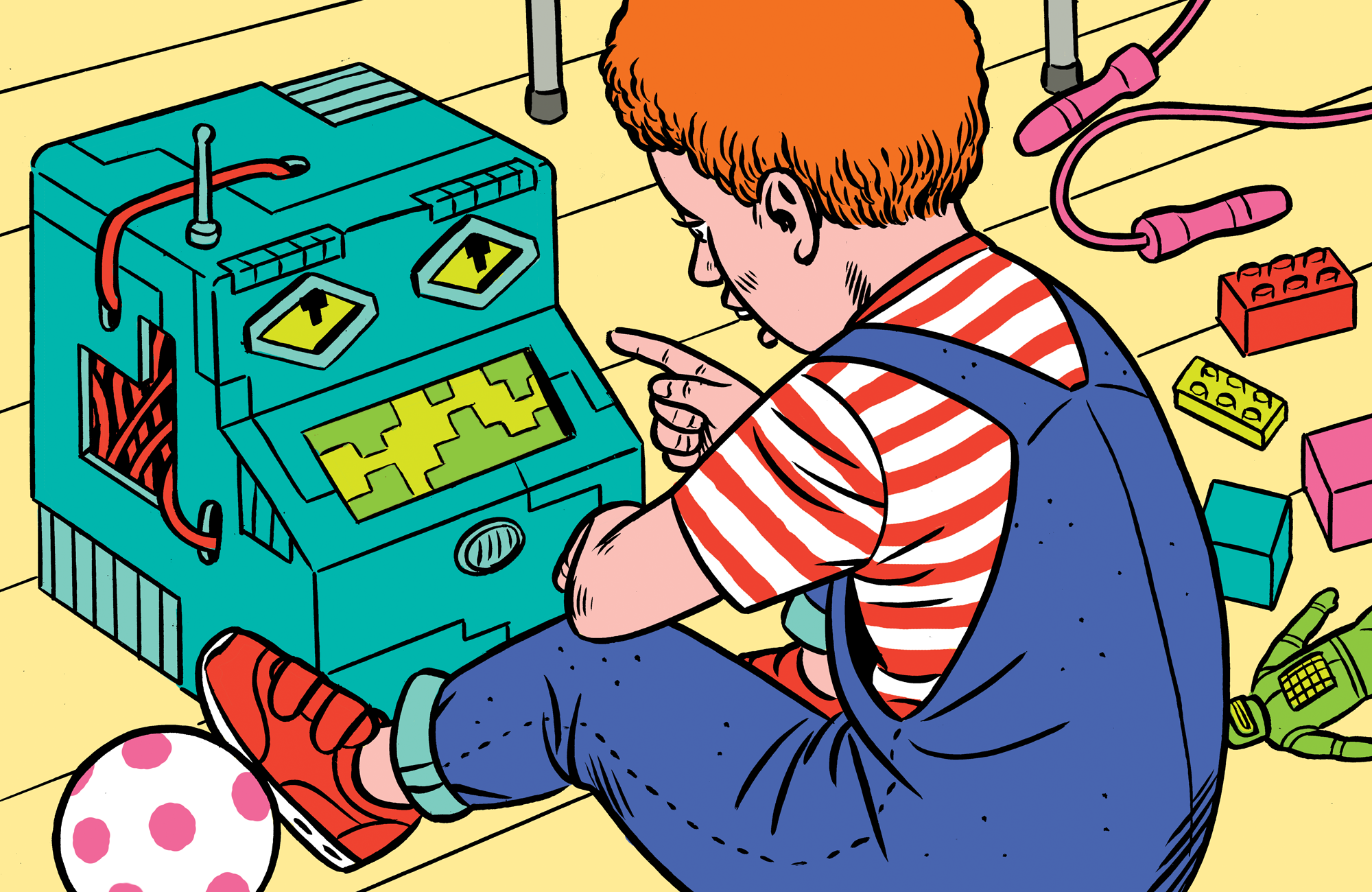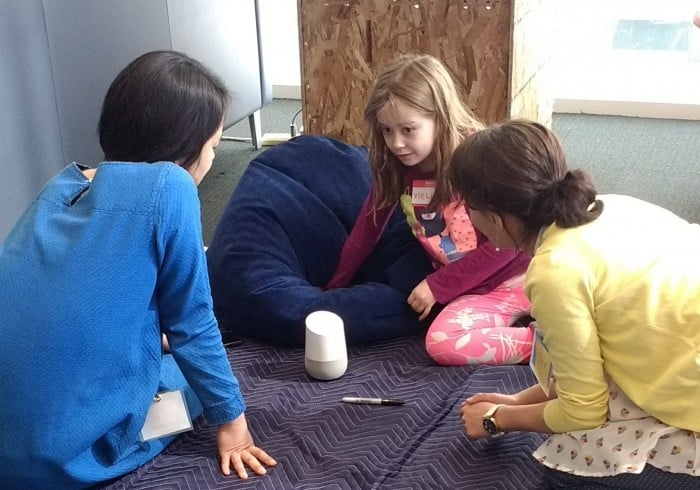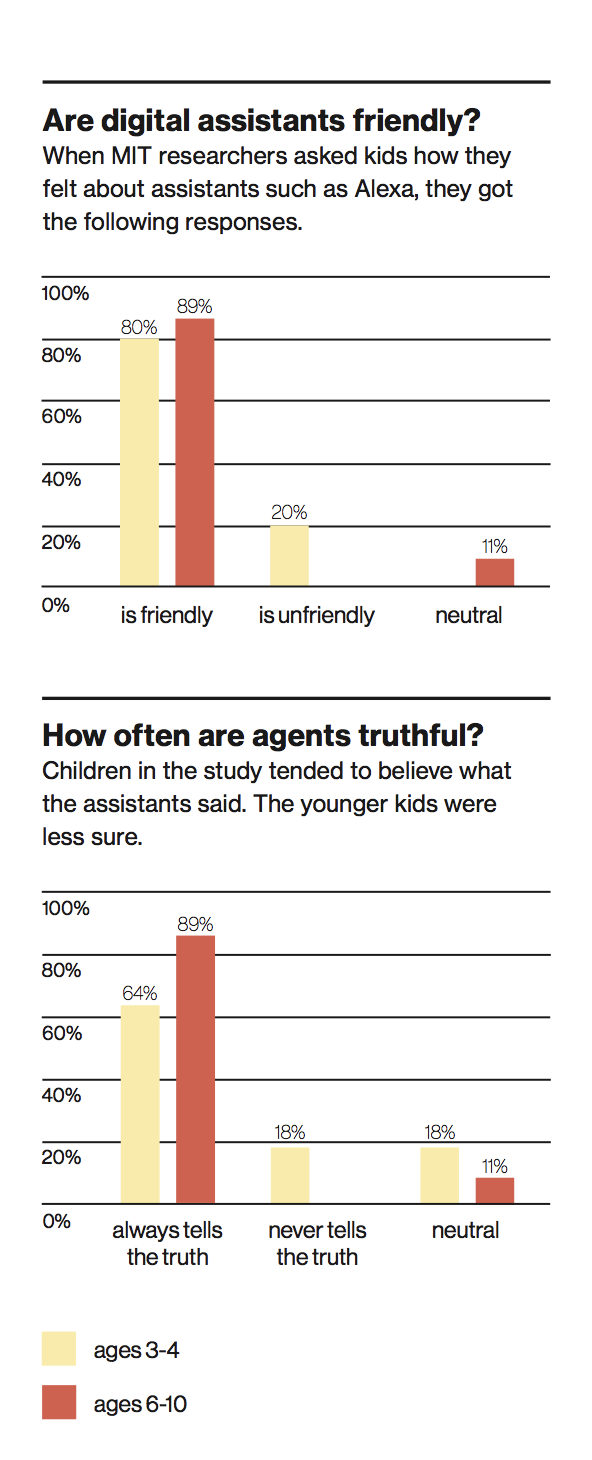Growing Up with Alexa

When it comes to digital assistants like Amazon’s Alexa, my four-year-old niece Hannah Metz is an early adopter. Her family has four puck-like Amazon Echo Dot devices plugged in around her house—including one in her bedroom—that she can use to call on Alexa at any moment.
“Alexa, play ‘It’s Raining Tacos,’” she commanded on a recent sunny afternoon, and the voice-controlled helper immediately complied, blasting through its speaker a confection of a song with lines like “It’s raining tacos from out of the sky” and “Yum, yum, yum, yum, yumidy yum.”
Giggling and clapping, Hannah danced around the room. I think this ability to get music on demand is neat, too, and I didn’t want to be rude, so I danced with her. But at the same time I was wondering what it’s going to mean for her to grow up with computers as servants.
The research firm eMarketer estimates that 60.5 million people in the U.S.—a little less than a fifth of the population—will use a digital assistant at least once a month this year, and about 36 million will do so on a speaker-based device like Amazon Echo or Google Home. These things are most popular among people age 25 to 34, which includes a ton of parents of young children and parents-to-be.
And these techno-helpers are not just going to get more popular; they will also get better at responding to queries and orders, and they’ll sound more humanlike, too. At the same time, young users like Hannah will become more comfortable and sophisticated with the technology, going beyond telling Alexa to play a song. They’ll request help with homework or control devices around their home.
It’s a little worrisome. Leaving aside the privacy implications of kids telling an Internet-connected computer all kinds of things, we don’t know much about how this kind of interaction with artificial intelligence and automation will affect how children behave and what they think about computers. Will they become lazy because it’s so easy to ask Alexa and its peers to do and buy things? Or jerks because many of these interactions compel you to order the technology around? (Or both?)

Some of that may happen. It seems more likely, though, that as with many technologies before this, the utility of digital assistants will outweigh their drawbacks. Already they’re making an incredible amount of data and computer-aided capabilities available directly to children—even those not yet in kindergarten—for learning, playing, and communicating. With Alexa, kids can get answers to all kinds of questions (both serious and silly), hear stories, play games, control apps, and turn on the lights even if they can’t yet reach a wall switch. And this is just the beginning of the kiddie AI revolution.
Does Alexa have feelings?
I wasn’t sure if Hannah knew whether Alexa is human. So I asked, and this is what she told me: Alexa is “a kind of robot” who lives in her house, and robots, she reasoned, aren’t people. But she does think Alexa has feelings, happy and sad. And Hannah says she would feel bad if Alexa went away. Does that mean she has to be nice to Alexa? Yes, she says, but she’s not sure why.
Her interest in her digital assistant jibes with some findings in a recent MIT study, where researchers looked at how children ages three to 10 interacted with Alexa, Google Home, a tiny game-playing robot called Cozmo, and a smartphone app called Julie Chatbot. The kids in the study determined that the devices were generally friendly and trustworthy, and they asked a range of questions to get to know the technologies (“Hey Alexa, how old are you?”) and figure out how they worked (“Do you have a phone inside you?”).

Cynthia Breazeal, one of the researchers and director of the Personal Robots Group at MIT’s Media Lab (as well as cofounder and chief scientist of the company developing an AI robot called Jibo), says that it’s not new for children to anthropomorphize technology. But now it’s happening a little differently.
For young kids like Hannah who can’t yet read, write, or type but can talk a mile a minute, voice-operated assistants could help build social skills and push boundaries—two things that are key to a child’s development. If nuances in the user’s tone can affect how the digital servants respond—which is not that unlikely in the near future—it’s possible that kids who use them will become more adept at communicating with others (be the others humans or robots).
That would be a change from what Breazeal sees today: a lot of bad behavior when we interact with each other using technology. She thinks that arises from the abstract context of, say, tweeting, where we may not fully appreciate the consequences of our interactions. She sees a huge opportunity for virtual assistants like Alexa, Google Home, and others to be designed in ways that push us to treat others the way we want to be treated.
Even though that isn’t the way Alexa works yet, it is teaching Hannah some things about how to treat machines, at least. Her mom, Susan Metz, tells me that she’s learning there’s a special pattern you have to use when asking Alexa things (you have to say a keyword like “Alexa” first), so she is figuring out that this voice assistant isn’t something you can speak to the way you would a person. Hannah has also learned that she has to be quiet when her mom is talking to Alexa (I can confirm this isn’t carrying over to times that Susan is talking with people). It is possible that simple, routine interactions with this kind of AI will help kids learn even without much advancement in the technology or its design.
Thing reviewed
Alexa
“Hey Google is it OK if I eat you?’: Initial Explorations in Child-Agent Interaction”
Stefania Druga, Randi Williams, Cynthia Breazeal, and Mitchel Resnick
Proceedings of the 2017 Conference on Interaction Design and Children
June 2017
Hannah uses Alexa to find out the time and date. That makes Elizabeth Vandewater, director of data science and research services at the University of Texas at Austin’s Population Research Center, wonder if easy access to these assistants will help some kids develop a sense for things like calendar days and minutes sooner than they would have previously. In a way that’s helpful—it’s one less question peppering parents from a talkative kid. And in fact, Susan says she’s happy that Alexa entertains Hannah. But it also brings a sense of robotic precision to life that most of us don’t really have to deal with until we’re older and more independent, entrusted with doing things like getting to school or work on time. Who knows if that’s a good thing?
Say what?
No matter how you’re using these digital butlers, the limits of the technology quickly become apparent. Voice-led interactions can still be difficult even for the clearest-speaking adults, and young kids don’t often enunciate that well.
Hannah had this problem a few times when she asked Alexa to play music from the Disney movie Moana and Alexa had no idea what she was trying to say. Hannah responded by doing what a lot of us would do when speaking to someone who can’t understand us: she spoke a lot louder, and slower. It still didn’t work, and Hannah got frustrated.
How to fix it? Breazeal and the other MIT researchers suggest that Alexa and similar “agents” could be designed to tell you why they don’t understand what you’re asking or commanding, so you can better determine how to get what you want. This makes a lot of sense, as we’re innately social (and like feedback), and it’s important to learn how to communicate with others in a way that takes their capabilities and levels of understanding into account.
What about older children? Will they get bossy and bratty from the habit of ordering Alexa around? Probably not, says Kaveri Subrahmanyam, a developmental psychologist and chair of child and family studies at California State University, Los Angeles. But she does wonder whether having digital butlers will reduce kids’ ability to do things for themselves. “I don’t think we have to be worried about it or paranoid about it, but I do think it’s something to be watchful for,” she says.
The other researchers I spoke to aren’t too worried either. “There’s this notion that if all this technology was turned off, everything would be great. We’d be interacting all the time, we’d be reading all the time,” Vandewater says. “I just don’t believe that.”
In fact, maybe the opposite can be true. Perhaps growing up with Alexa will actually make technology less distracting, enabling it to, in a sense, fade into the background; we’ll get what we need from it, and then move on with our lives until we come back with another request.
For Hannah, at least, this seems to be the case for now. She didn’t want to spend much time inside playing with Alexa, and so shortly after we finished dancing to “It’s Raining Tacos,” she ran outside to chase her little brother around the yard.
Keep Reading
Most Popular
Large language models can do jaw-dropping things. But nobody knows exactly why.
And that's a problem. Figuring it out is one of the biggest scientific puzzles of our time and a crucial step towards controlling more powerful future models.
How scientists traced a mysterious covid case back to six toilets
When wastewater surveillance turns into a hunt for a single infected individual, the ethics get tricky.
The problem with plug-in hybrids? Their drivers.
Plug-in hybrids are often sold as a transition to EVs, but new data from Europe shows we’re still underestimating the emissions they produce.
Stay connected
Get the latest updates from
MIT Technology Review
Discover special offers, top stories, upcoming events, and more.